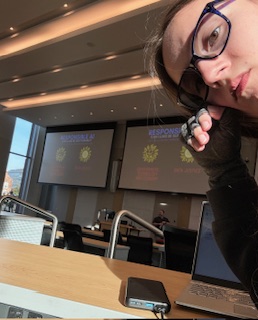Event name: “Responsible AI: Can LLMs be sustainable?”
Name of Presenter: Boris Gamazaychikov
Event time and place: 10/30/2024 at Thurgood Marshall Hall
Boris was consistently working on climate and sustainability, and spent the first part of his career working on green buildings and decarbonization in them. He now works for a company that sells software and AI to other companies, thus has lots of knowledge working with AI. He believes that LLMs can be sustainable, and that that can be done by scaling the energy consumption to the tasks they need to complete, and not using the largest models for everything. AI can be used to reduce emissions by predicting server usage and energy use to optimize them, and working in assisting material discovery. It can also help analyze climate data and carbon footprints to get insights about this massive data. However, LLMs are notably not necessary for these developments. Boris believes that, more than picking up trash and planting trees, the best thing that someone can do for the environment is bringing a sustainability mindset into their jobs and daily lives, opting to employ more sustainable solutions into different industries and opting not to use AI.
The EU AI act, passed about a year ago, requires companies to publish data on their training of AI and their efficiency and environmental impact, something that doesn’t happen in America, and Boris would like to see more transparency on LLMs in America. To train LLMs, they take in huge amounts of data and study it, a process that requires massive amounts of energy. Meta is currently doing a lot of good work to release open source AI so that people don’t need to train it themselves. Overall, the AI industry has such huge potential to improve efficiencies, but those aren’t being taken advantage of properly at the moment. They can develop AI for very specific purposes with less but higher quality data. However, most organizations don’t really care about their environmental impact, even though a lot of people individually do care, although more companies are trying to get better. Boris thinks that AI is probably going to result in a lot of destruction of jobs, but that disruption of our systems may be beneficial in the long run.
I think a lot of Boris’s points were convincing, but some of them were a bit hard to understand. One of his big points is about transparency in energy use from AI training, and I thought that that was a really good point. Since AI companies don’t have to reveal how much energy they are using to train AI, it makes things difficult for even the climate conscious to truly understand their impact. Making them be transparent about their energy usage is really the first step to figuring out how to make the industry more sustainable, and I think Boris did a good job of driving that in. I think that I would have preferred for the presentation to be more structured, as the question and answer format left it feeling rather jumpy for me, and specific topics really didn’t go into too much detail. I would have liked to see more information on the how of these AI, to better show how they are impacting the environment. I already was somewhat familiar with the energy cost of AI training, as I had taken a class on AI last semester, but the energy cost of the usage of AI is something I haven’t really gotten an expert’s perspective on.
However, a big thing that confused me is that rather early on, Boris said that, to answer the question presented in the title of the presentation, that he did believe that LLMs could be sustainable. He talked a bit about how AI was able to help the environment, but throughout the entire presentation, never really gave any reasons as to why LLMs were worth continuing to develop. He only talked about how the impact of AI could be reduced and made useful to the environment by scaling back on its capacity, a usage that specifically discourages the use and development of LLMs. He did not really give a single reason how LLMs could be sustainable, contrary to the name of the presentation.



